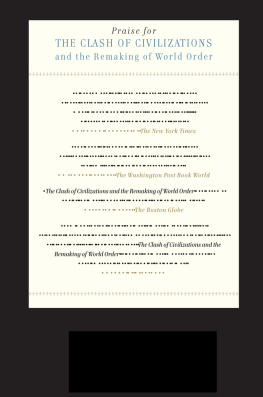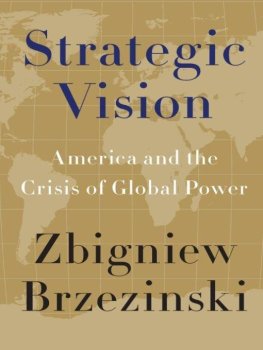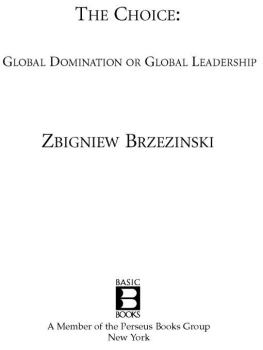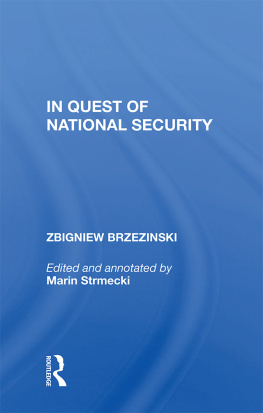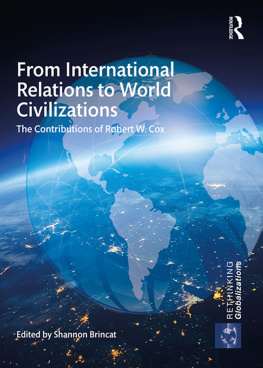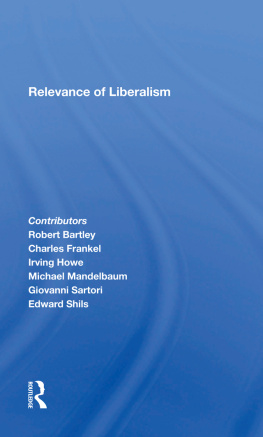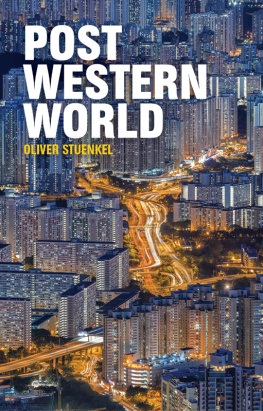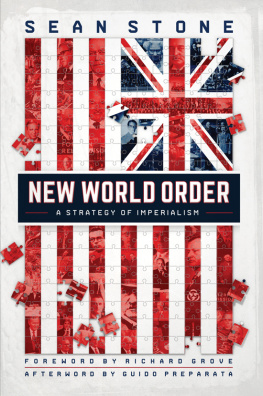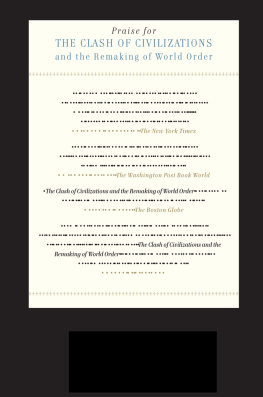
Samuel P. Huntington


SIMON & SCHUSTER
1230 Avenue of the Americas
New York, NY 10020
www.SimonandSchuster.com
Copyright 1996 by Samuel P. Huntington
Foreword 2011 by Zbigniew Brzezinski
All rights reserved, including the right to reproduce this book or portions thereof in any form whatsoever. For information, address Simon & Schuster Subsidiary Rights Department, 1230 Avenue of the Americas, New York, NY 10020.
This Simon & Schuster hardcover edition August 2011
SIMON & SCHUSTER and colophon are registered trademarks of Simon & Schuster, Inc.
The Simon & Schuster Speakers Bureau can bring authors to your live event. For more information or to book an event, contact the Simon & Schuster Speakers Bureau at 1-866-248-3049 or visit our website at www.simonspeakers.com.
Designed by Karolina Harris
Manufactured in the United States of America
1 3 5 7 9 10 8 6 4 2
Library of Congress Cataloging-in-Publication Data
Huntington, Samuel P.
The clash of civilizations and the remaking of world order / Samuel P. Huntington.
p. cm.
Includes index.
1. World politics1989 2. Post-communism. 3. Civilization,
Modern1950 I. Title. D860.H86 1996
909.82'9dc20 96-31492
ISBN: 978-1-4516-2716-9
ISBN: 978-1-4165-6124-8 (ebook)
To Nancy,
who has endured the clash with a smile
Foreword

The Clash of Civilizations and the Remaking of World Order is a seminal book. It has redefined the meaning of the worlds current turmoil and provided a new vocabulary for interpreting the novel complexities of our increasingly compacted world. No wonder that Samuel Huntingtons initially stunning but increasingly compelling analysis of the tectonic shifts in the interrelationship between faith, culture, and politics has earned a place on the shelf of only about a dozen or so truly enduring works that provide the quintessential insights necessary for a broad understanding of world affairs in our time.
And no wonder also that The Clash evoked not only admiration for its sweeping scope and impressive depth but also (and especially so at first) academic skepticism about its transcendence over traditional lines of division within the social sciences, not to mention some ad hominem attempts to impugn Hunting-tons personal values or to exploit his views on behalf of Manichean causes. The sheer size of his books global readership testifies that it satisfied the widespread craving for a comprehensive understanding of our currently turbulent historical reality more insightfully than anything else in the classical social science disciplines.
But before going any further, I must share with the reader two personal disclosures: Sam Huntington and I were close friends for most of our adult lives. We were graduate students at Harvard, and then young academics. Not only were we close friends, so were our wives. After Sam left Harvard for Columbia, he persuaded me to follow him there. Our paths separated when he chose to return to Harvard and I did not. But we still managed to write a book together and, later, he joined me in the White House, where he conducted a wide-ranging strategic assessment of the US-Soviet rivalry for global power that significantly influenced the policies of both the Carter and Reagan administrations.
Secondly, though we were friends, we occasionally disagreed. I have to confess that I was skeptical of his grand thesis when it was first previewed as an article in the July 1993 issue of Foreign Affairs . Like some others, I was immensely impressed by the articles ambitious scope but also perplexed by what I perceived to be its implied imposition of a historically comprehensive and intellectually sweeping framework on the complex dynamics of contemporary nationalistic, religious, and social conflicts within a world that is now uniquely interactive. But as a consequence of my participation in subsequent discussions between Sam and some of his critics, and especially after reading this book on its publication, my reservations faded. I came to realize that his grand thesis and overarching synthesis provided insights vital not only for understanding contemporary world affairs but also for intelligently shaping them.
The last point needs stressing. Huntingtons book provides, in addition to a truly brilliant interpretation of the complexities of political evolution, the essential intellectual launchpad for policies that involve neither a mindlessly passive capitulation to simplistic historical determinism nor a passionate embrace of civilizational conflict as the inevitable moral imperative of our time. Not surprisingly, some of the advocates of such extreme views were seduced after 9/11 by the clarion call for action that on the public level reduced elusive civilizational challenges confronting America to the simple slogan: We love freedom, they hate freedom. And no wonder that the policy conclusions drawn from such a simplistic and rather demagogic contrast had self-destructive consequences when applied to real life.
In truth, The Clash of Civilizations and the Remaking of World Order represented in its policy implications a grand warning. Almost a decade before 9/11, Huntingtons message was that in todays politically awakened world, our consciousness of several civilizations mandates requiresas nuclear weapons with their unprecedented scale of danger already requirethat we rely on cross-civilizational coalitions based on reciprocal rationality, respect, and restraint in order to manage the relations between nations. Thus, Huntingtons work is not only intellectually pioneering; it dares to be politically wise.
Zbigniew Brzezinski
April 2011
Contents

List of Illustrations

Tables
Figures
Maps
Preface

In the summer of 1993 the journal Foreign Affairs published an article of mine titled The Clash of Civilizations?. That article, according to the Foreign Affairs editors, stirred up more discussion in three years than any other article they had published since the 1940s. It certainly stirred up more debate in three years than anything else I have written. The responses and comments on it have come from every continent and scores of countries. People were variously impressed, intrigued, outraged, frightened, and perplexed by my argument that the central and most dangerous dimension of the emerging global politics would be conflict between groups from differing civilizations. Whatever else it did, the article struck a nerve in people of every civilization.
Given the interest in, misrepresentation of, and controversy over the article, it seemed desirable for me to explore further the issues it raised. One constructive way of posing a question is to state an hypothesis. The article, which had a generally ignored question mark in its title, was an effort to do that. This book is intended to provide a fuller, deeper, and more thoroughly documented answer to the articles question. I here attempt to elaborate, refine, supplement, and, on occasion, qualify the themes set forth in the article and to develop many ideas and cover many topics not dealt with or touched on only in passing in the article. These include: the concept of civilizations; the question of a universal civilization; the relation between power and culture; the shifting balance of power among civilizations; cultural indigenization in non-Western societies; the political structure of civilizations; conflicts generated by Western universalism, Muslim militancy, and Chinese assertion; balancing and band-wagoning responses to the rise of Chinese power; the causes and dynamics of fault line wars; and the futures of the West and of a world of civilizations. One major theme absent from the article concerns the crucial impact of population growth on instability and the balance of power. A second important theme absent from the article is summarized in the books title and final sentence: clashes of civilizations are the greatest threat to world peace, and an international order based on civilizations is the surest safeguard against world war.
Next page
